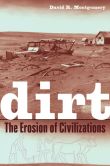"Water scarcity poses the most severe human security challenge in Iran today," said Gary Lewis, United Nations Resident Coordinator for Iran.
The cause of the crisis is not in residential use; agriculture accounts for about 90 percent of water consumption, with much of it being used inefficiently.
Government figures show that only a third of agricultural water use is efficient, say U.N. officials. This inefficient management stretches across Iran and other countries in the region, including neighboring Iraq and Afghanistan where wars make it difficult to tackle environmental issues.
Major rivers in the cities of Isfahan and Shiraz, and on Iran's border with Afghanistan, have dried up. The depletion of the Tigris and Euphrates rivers in Iraq has contributed to other environmental problems such as dust and sand storms.
With government policies mired in bureaucracy, the U.N. has offered to help. In 2012, the world body launched a pilot program to work with farmers near Lake Orumieh.
Farmers learned how to make compost, switched to organic-based fertilisers and attended weekly classes on water management which led to a 35 percent drop in consumption.
The new techniques have also allowed farmers to reduce costs and increase variety of crops from just wheat and beets to add maize, squash, onions and tomatoes.
Farming Reforms Offer Hope for Iran's Water Crisis


No comments:
Post a Comment